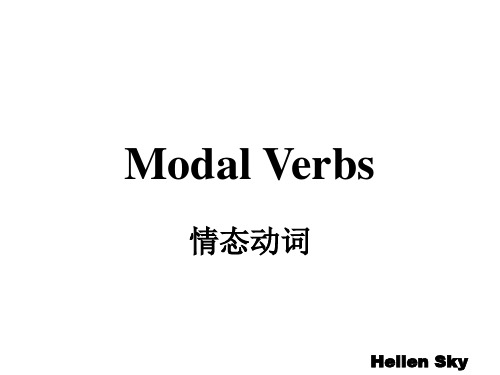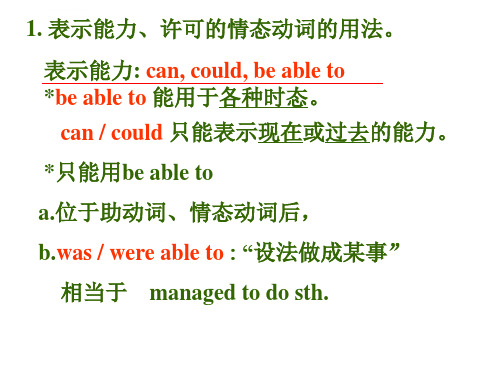必修三unit1语法情态动词
必修三英语unit1情态动词的用法37页PPT

31、只有永远躺在泥坑里的人,才不会再掉进坑里。——黑格尔 32、希望的灯一旦熄灭,生活刹那间变成了一片黑暗。——普列姆昌德 33、希望是人生的乳母。——科策布 34、形成天才的决定因素应该是勤奋。——郭沫若 35、学到很多东西的诀窍,就是一下子不要学很多。——洛克
必修三英语unit1情态动词的用法
11、获得的成功越大,就越令人高兴 。野心 是使人 勤奋的 原因, 节制使 人枯萎 。 12、不问收获,只问耕耘。如同种树 ,先有 根茎, 再有枝 叶,尔 后花实 ,好好 劳动, 不要想 太多, 那样只 会使人 胆孝懒 惰,因 为不实 践,甚 至不接 触社会 ,难道 你是野 人。(名 言网) 13、不怕,不悔(虽然只有四个字,但 常看常 新。 14、我在心里默默地为每一个人祝福 。我爱 自己, 我用清 洁与节 制来珍 惜我的 身体, 我用智 慧和知 识充实 我的头 脑。 15、这世上的一切都借希望而完成。 农夫不 会播下 一粒玉 米,如 果他不 曾希望 它长成 种籽; 单身汉 不会娶 妻,如 果他不 曾希望 有小孩 ;商人 或手艺 人不会 工作, 如果他 不曾希 望因此 而有收 益。-- 马钉路 德。
人教版高一英语必修三 unit1 grammar 情态动词课件

e.g: He must/can/may/might know the answer to the question.
表推测的 三种句式
2. 否定句:can't/couldn't (不可能),may not/might not (可能不)
e.g: It can't/ couldn't be the Miss Lin. She has gone to America.
The boy can’t be Jim. He’s can可能 much taller.
can’t不可能 这个男孩不可能是吉姆。他 要高很多。
2. 常见情态动词
原形
用法
含义
例句
(过去式)
may
(might)
Tony may know the way.
表示可能性(可 与maybe互换)
可能
=Maybe Tony knows the way.
2. 常见情态动词
原形
用法
(过去式)
表示能力(= be able to)
含义
例句
能;会
Tom can swim. =Tom is able to swim.
汤姆会游泳。
can
(could)
(疑问句中)表示 请求
可以 Could you give us a hand?
你可以帮我们一下吗?
(否定句、疑问 句中)表示可能 性
• can 不肯, may 不问,must 不否问
注释: can表示推测通常不用于肯定句 may表示推测通常不用于疑问句 must表示推测通常不用于否定句和疑问句
肯定猜测的语气强弱:must>can> could>may>might
Book 3 Unit 1 Grammar 情态动词 (一)

Book 3 Unit 1 Grammar 情态动词情态动词can,may,must,should,shall,will的用法比较情态动词有一定的含义,表达某种感情和说话的口气,不可以单独作谓语动词。
所以情态动词没有人称和数的变化,后面跟的动词需用原形,否定式构成是在情态动词后面加"not"。
个别情态动词有现在式和过去式两种形式, 过去式用来表达更加客气, 委婉的语气, 时态性不强, 可用于过去,现在或将来。
一.can / could 与be able to的用法比较1.can “能够,会”,过去式为could,表示能力,与be able to同义。
但be able to有各种时态,还可以表示成功地做了某事。
在否定句中can,could和be able to无区别。
He can speak English. 他会说英语。
He could speak English at the age of six. 他六岁就会说英语了。
I can’t / I will not be able to come this afternoon. 今天下午我来不了。
The fire spread quickly, but they were able to get out.火势蔓延得很快,但他们都成功地逃出来了。
2.can表示可能,怀疑,不相信或惊异的态度。
而could既可以表示过去也可以表示现在的“可能”,其可能性比can小。
Accident can happen any time. 事故随时都会发生。
This cannot be done by him. 这决不可能是他干的。
It could be true. 这也许是真的。
3.can / could 表示允许,could语气更委婉。
在回答对方提问时要用can,不用could。
-Could / Can I ask you a question?-Yes, of course you can.4.can / could + have done的否定式或疑问式表示对过去发生事情的不肯定或怀疑。
新人教必修3_Unit1_Grammar情态动词]
![新人教必修3_Unit1_Grammar情态动词]](https://img.taocdn.com/s3/m/35b7c822453610661ed9f4a7.png)
3. may 与might
1). 表示“许可”或“请求”,在这样的句中,might比m 语气更委婉,客气。 肯定回答用may或can,否定 回答时用mustn't或can't,表示“不可以”或“禁止”。 Eg: --- May I come in ? 我可以进来吗? --- Yes, you may/can. 可以,请进来。 --- No, you mustn’t/can't. 不,你不能。
4. 用于祈使句表祝愿。
Eg: May you succeed! May God bless you!
5. may have done 和might have done 表示 对过去的推测。
1. Sorry I'm late. I _____ A have turned off the alarm clock and gone back to sleep again. A. might C. can B. should D. will
二、表示对过去所发生事情的遗憾或责备
1. should/ought to have done “过去本该做而没做” eg: I really regretted wasting the hours when I should have studied hard, but it was too late. 2. shouldn’t/oughtn’t to have done “过去不该做的事却做了” eg: I’m very sorry for the words I shouldn’t have said to you at that moment. 3. could/might have done “本来能够做的事却没做” eg: He could have worked out the problem.
高一英语英语必修3Unit1语法情态动词课件精选

高一英语英语必修3Unit1语法情态动词课件精选一、教学内容本节课选自高一英语必修3 Unit1的语法情态动词部分。
具体内容包括:1. 章节内容:Unit1 Festivals around the world2. 详细内容:情态动词的用法,包括can, may, must, need, should等;情态动词在肯定句、疑问句和否定句中的使用;情态动词与动词原形的搭配。
二、教学目标1. 掌握情态动词的基本用法,能够正确运用情态动词表达推测、许可、能力等。
2. 能够在肯定句、疑问句和否定句中正确运用情态动词。
3. 能够通过本节课的学习,了解并尊重世界各地的文化差异。
三、教学难点与重点1. 教学难点:情态动词的用法区别,如can和be able to的用法区分,情态动词在疑问句中的用法等。
2. 教学重点:掌握情态动词的基本用法,能够在实际语境中正确运用。
四、教具与学具准备1. 教具:多媒体课件、黑板、粉笔。
2. 学具:学生用书、练习册、笔记本。
五、教学过程1. 导入:通过展示世界各地节日的图片,引导学生谈论自己了解的节日,引入新课。
2. 讲解:结合教材,详细讲解情态动词的用法,通过例句、对比等方式帮助学生理解。
3. 实践:设计实践情景,让学生运用情态动词进行对话练习。
4. 例题讲解:分析并讲解教材中的例题,帮助学生巩固所学知识。
5. 随堂练习:布置教材中的练习题,及时检查学生的学习效果。
六、板书设计1. 情态动词的基本用法can/may/must/need/should + 动词原形2. 情态动词在肯定句、疑问句和否定句中的使用3. 情态动词的用法区别七、作业设计1. 作业题目:a. 根据所学情态动词,完成下列句子。
b. 运用情态动词,编写一段关于节日的对话。
2. 答案:a. 例如:He can speak English fluently. / Can I go to the party?b. 例如:A: Can you tell me about the Spring Festival?B: Sure. The Spring Festival is the most important festival in China. We usually celebrate it with our families. We must clean our houses and make delicious food.八、课后反思及拓展延伸1. 反思:关注学生在课堂上的表现,及时了解他们对情态动词用法的掌握程度,调整教学方法。
必修3Unit1情态动词语法ppt课件

例1:---Could I borrow your dictionary?
---Yes, of course you____.
A. might
B. will
C. can
D. should
析:选C。该句用can的委婉表达式could 来征 求对方意见,could 和might通用,但回答 时必须要用can或may,因此该题不选A.
火灾袭来时要迅速疏散逃生,不可蜂 拥而出 或留恋 财物, 要当机 立断, 披上浸 湿的衣 服或裹 上湿毛 毯、湿 被褥勇 敢地冲 出去
should
should
should用于构成将来时是助动词。should用于表示 “应当”“猜测”是情态动词。
(1) 表示义务,责任,意为“应当” 。
You should pay for your taxes.
析:选A。根据规定need用于一般疑问句 作肯定回答应换成must,而作否定回答 时,使用need的否定式needn’t。
火灾袭来时要迅速疏散逃生,不可蜂 拥而出 或留恋 财物, 要当机 立断, 披上浸 湿的衣 服或裹 上湿毛 毯、湿 被褥勇 敢地冲 出去
7.
shall和should的用法
• Shall
火灾袭来时要迅速疏散逃生,不可蜂 拥而出 或留恋 财物, 要当机 立断, 披上浸 湿的衣 服或裹 上湿毛 毯、湿 被褥勇 敢地冲 出去
例1:---Must I start at once?
---No, you____.
A. needn’t
B. mustn’t
C. can’t
D. won’t
析:A。由语境可知该答句表示“不必”, 而mustn’t表示“不准、禁止”,不符合语 境,显然应使用needn’t表示“不必”,但 肯定句回答继续用must。
英语人教版必修3课件:Unit 1 Section Ⅲ Grammar——情态动词(Ⅰ)

4.shall 和 should 的用法 (1)shall 的用法 用于肯定句的第二、第三人称,表示允许、警告、命令、决 心、威胁等;用于第一、第三人称的疑问句,表示征求对方意见。 When shall he be able to leave the hospital? 他什么时候能离开医院? You shall fail if you don't work hard. 如果你不努力学习你会考试不及格。
[名师点津] can 和 be able to 用法上的区别: (1)can 只能用于现在时和过去时,而 be able to 有更多的时 态变化,可用于将来时、完成时和非谓语动词中。 (2)can 一般指自身具有的能力,而 be able to 表示经过一段 时间的努力后所具有的能力,相当于 manage to do 或 succeed in doing。 Without hard work, he was not able to get good grades. 如果没有努力,他是不能取得好成绩的。(经过努力) Babies can swim when they are born. 婴儿们刚生下来时会游泳。(自身具有的能力)
2.may 和 might 的用法 (1)表示许可或请求许可。(用 might 比用 may 更礼貌,语 气更委婉) —May I come in? ——我可以进来吗? 肯定回答: —Yes, you may./Of course, you may. ——是的,请进。
否定回答: —No, you may not/you can't/you mustn't/you had better not. ——不,你不可以/你最好不要。 Might I ask you a question? 我可以问你一个问题吗? He asked if he might borrow my pen. 他问我是否可以借我的钢笔。
高一英语英语必修3Unit1语法情态动词课件

2迈4.11克.202一0 定还没有找回他的车, 因为早上他是
18
坐公共汽车来上班的。
need & dare (dared)
情态动词 : (无单三形式)
need/dare do sth need/dare not do sth 实意动词: need/dare to do sth don’t/doesn’t/didn’t dare to do sth
24.11.2020
22
2 Some aspects of a pilot’s job_____ be
boring, and pilots often _____ work at inconvenient hours. (2006 湖南) A. can;have to B. may;can
C. have to; may
24.11.2020
10
4.shall和should
shall 用法 1. shall表征求意见,用于一三人称 疑问句中
Shall we go by train, Mom? Shall he attend the meeting? 2.用于二 三人称 的陈述句中,表威胁警告命令允诺等语 气 You shall get a present when I came back. You shall be punished if you break the rules.
Wuhan.
2. At this moment, our teacher ___m__u_s_t_b__e_m__a_r_k_ing
our exam papers.
这时, 我们老师想必在批改试卷。
3. The road is wet. It _m__u_s_t_h__a_v_e__r_a_in__edlast night.
- 1、下载文档前请自行甄别文档内容的完整性,平台不提供额外的编辑、内容补充、找答案等附加服务。
- 2、"仅部分预览"的文档,不可在线预览部分如存在完整性等问题,可反馈申请退款(可完整预览的文档不适用该条件!)。
- 3、如文档侵犯您的权益,请联系客服反馈,我们会尽快为您处理(人工客服工作时间:9:00-18:30)。
used to I ___________ cry when I was a child.
12
4.shall和should
shall 用法 1. shall表征求意见,用于一三人称
Shall we go by train, Mom? Shall he attend the meeting? 2.用于二 三人称 的陈述句中,表威胁警告命令允诺等语 气 疑问句中
needn`t No, you _________./you don’t have to. ★mustn‘t 表禁止,不准,一定不要。 You mustn`t play with fire. ____________________________. 你不准玩火。 ____________________________. 你不准吸毒。 You mustn`t take drugs.
2.You will happy when you get a gift.
^be
3.You can be taken Bus No.3 to the theatre. take
4.We should to help each other.
5.You can coming come a little earlier.
Modal Verbs 情态动词
什么是情态动词?
情态动词表示说话人的 某种感情或语气,对某 一动作或状态的某种态 度。表示“需要、可以、 必须、应当”等。
2
说出下列情态动词的中文意思
可以,能够,可能 1.can/could____________________ 可以;或许,可能;祝愿 2.may/might____________________
You shall get a present when I came back.
You shall be punished if you break the rules.
13
should 用法
1. 应该=ought to
You should study hard.
2. “居然”,“竟然”,表说话人意料之外。
5.We should help each other.
• 情态动词的特点:
1.情态动词自身都有一定的意义。 2.情态动词后接动词原形。 3.情态动词没有人称和数的变化, 也没有非谓语形式。
5
1. can和could
1. can的主要用法是: A. 表能力 can dance very well. eg. The girl __________ 这女孩舞跳得很好 B. 表示说话者的推测﹑事物的可能性:(否、疑) eg. _______ the news _______? Can be true 这条新闻会是真的吗? C. 在口语中, can可以表示请求或允许: eg. ____________________? Can I sit here 我可以坐这里吗?
15
2. must 一定,肯定 He ____________be crazy.他一定疯了。 must He ____________________(stay)up last night. must have stayed 他昨晚一定熬夜了
16
阅读下列学生书面表达常见错误句子并改正:
back to school again. 1.Thanks to your help,I can go back
17
学以致用:根据提示写一篇小短文,注意谓语动词形式。
假如你是李华,你的美国朋友Jack四月份即将来中国旅游,写信向你了解你所在 城市的天气、食及交通等方面的情况。请你根据提示用用英文给Jack 写一封 回信。 1.四月天气暖和,四月底有点热,建议他带薄外套、T恤和短裤。 2.饮食:有很多中国传统小吃(介绍一两样),如果不习惯中餐,可以去KFC。 3.交通:从机场到你所在城市开车大概2个小时。建议他做大巴比较便宜,打出租 车很贵。 4.希望Jack 能多呆几天,以便你可以带他游览风景名胜。 注意:1.可根据情况增加细节以使行文流畅 2.字数100左右。 3.参考词汇: T恤和短裤T-shirt and pants 风景名胜places of interest Dear Jack, I am very excited to know that you will come to China for sight-seeing in April.You want to know something about my city,now I am wtiting to tell you in detail. ______________________________________________________________________ 18 ___________________________________________________________________
5.must的主要用法
1. 必须。must表主观“必须” have to 表客观“不得不” I must go home this Saturday. I’ve got a cold, so I have to see a doctor.
---Must I stay here?
---Yes, you ________. must
May you have a good journey! D. may as well=had better do 最好做某事 You’d better take notes carefully. You may as well take notes carefully.
9
3.will和would
参考范文:
Dear Jack, I am very excited to know that you will come to China for sight-seeing in April.You want to know something about my city,now I am wtiting to tell you in detail. It is warm in my city in April,but it can be a little bit hot at the end of this month.Thus you don`t have to bring thick clothes,just some thin coats ,T-shirts and pants.In your letter,you were worried about the traffic.It is very convenient for you to reach my city.There are buses which will take you here in two hours from the airport every thirty minutes.Besides,the price of ticket is reasonanble.You had better not take taxi ,it is too expensive. I hope you can stay here for several days so that I can show you the places of interest in my city.You may experience a very pleasant trip of good view and delicious food.There are many kinds of Chinese traditional food including Jiaozi and Zongzi.If you are not used to these,we can go to the KFC where you can have food you like. I am looking forward to seeing you soon. 19 Yours,
6.You must be return the book before the Summer vacation. 7.I will waiting for you at the entrance . wait 8.You should bought a small gift when you visit a friend of buy yours.
11
would & used to (过去常常,习惯于)
would do 现在有可能做,也有可能不做
used to do过去常做(现在已经不做了)
used to There ____________be a big tree.
would I __________go to the library when I was free.
B. 表示说话人的猜测: “也许” “可能”: 通常只用于肯
定句和否定句中。
The guest may arrive this afternoon. ---Can he attend the meeting? ---Yes, he____. may I am not sure.
8
C. 表示祝愿,位于句首 eg. May you succeed! 祝你成功!
2.提出 请求或建议 ,在疑问句中用于第二人称。
eg: If you want help, let me know, will you? Will you marry me?嫁给我好吗? ★祈使句问句与答语一般用will will you? Open the door, _______ --- Please come to my party. will --- Yes, I________. 3. 表习惯或必然结果 Fish will die without water.没有水鱼会死。 I will go to see my former classmates on weekends. 周末我会去看望以前的同学。
